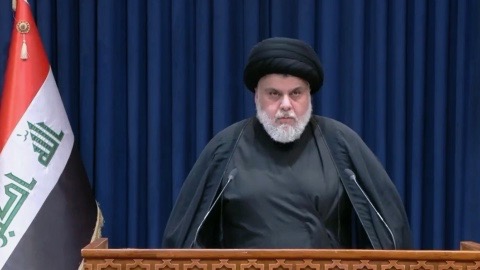In a speech on August 3, Sadr asked his supporters to continue their sit-in inside the Iraqi parliament building and rejected calls for dialogue issued by Prime Minister Mustafa al-Kadhimi

Muqtada al-Sadr. (Photo: Iraqi New Agency)
In a speech on Wednesday, August 3, Iraqi clecric Muqtada al-Sadr asked his supporters sitting inside the parliament building since last Saturday to continue their sit-in until the current parliament is dissolved and early elections are held.
In a televised speech that was delivered from his stronghold Najaf, Sadr rejected the calls for dialogue with the Coordination Framework and other parties as suggested by caretaker Prime Minister Mustafa al-Kadhimi and President Barham Salih earlier. Calls for dialogue had also been extended by most other parties in the parliament, including Coordination Framework’s ally al-Fatah.
Sadr claimed that his attempts for a dialogue had failed and “it has brought nothing to us and to the nation but only ruin and corruption,” Al-Jazeera reported. “I know the majority of the people are fed up with the whole ruling class, which also includes some affiliated with the Sadrist movement,” he said, claiming that all of the existing ruling class will “not exist anymore,” Rudaw reported.
Several political groups in Iraq welcomed Sadr’s speech on Wednesday and expressed their support for his calls for early elections. Former Prime Minister Haider al-Abadi, now the head of the al-Nasr front in the parliament with four seats, called for reforms to the country’s political system.
Hadi al-Amiri, head of the al-Fateh alliance which is an ally of the Coordination Framework, also supported the call for fresh elections claiming that “previous elections were marred by a lot of suspicion and objections.”
The Iraqi Communist Party (ICP) had already supported the call for fresh elections in the country. The leaders of the Democratic Way, a broad coalition of parties including the ICP, called for peaceful reforms to the country’s political system in a press conference on August 2. Raid Fahmi, Iraqi politician and economist, in a tweet on Wednesday also supported the need for popular pressure to bring necessary political reforms.
The storming of the parliament building located in the high security Green Zone in capital Baghdad last week came after the nomination of Mohammad Shia al-Sudani as the new prime minister by Sadr’s rival, the Coordination Framework. Sadr had claimed that Sudani was corrupt and not acceptable as the prime ministerial candidate.
Elections in Iraq were held in October last year in which no party or coalition could win the necessary majority. The Sadrist movement won the largest number of seats (73), but all its MPs resigned last month on Sadr’s instructions after he failed to create a national majority government.
Sadr had proposed a national majority government as a partial way to address the demands of protesters who want a complete overhaul of the political system devised under the US led-occupation in 2004.
Protests against the political system and ruling elites in Iraq have been going on for years now. Protesters have accused the ruling elite of being inefficient and corrupt, surviving in power due to the sectarian quota or Muhasasa system. They have demanded an end to this quota system.
Sadr had claimed that a majority government, unlike the consensus based administration, would be more accountable to the people.